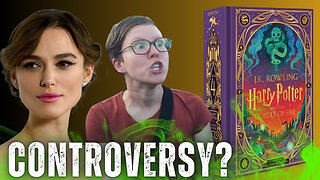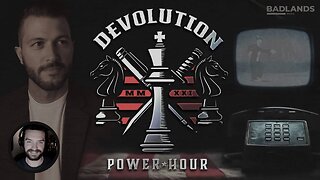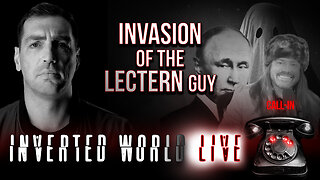Premium Only Content

Episode 3237: Borrowed Truth: Non-Catholic Denominations Stole from the Catholic Church
www.catholic-reboot.com
Nightly Zoom Coordinates for Rosary:
Meeting ID: 865 8978 0399
Passcode: Wjjv4960!
Speak Lord for your Servant is Listening
Book Recommendation of the Day
St. Francis de Sales, The Catholic Controversy (also published as The Controversies).
Why this one?
• Written by a canonized saint and Doctor of the Church specifically to win Protestants back to the Catholic Church during the Reformation.
• Crystal-clear on Church authority, Scripture vs. Tradition, the marks of the true Church, sacraments, and why schism/heresy can’t claim the fullness of Christ’s religion.
• Pastoral but firm perfect for your theme that non-Catholic groups live on borrowed Catholic truths
When the Church or her members act as though something illegitimate were legitimate, the result is not peace but betrayal. To affirm heresy as if it were truth, or to treat schism as if it were unity, is to lend credibility to lies. Our Lord Himself warned: “Let your ‘Yes’ mean ‘Yes,’ and your ‘No’ mean ‘No’; anything more comes from the Evil One” (Matthew 5:37).
Truth, by its nature, does not coexist peacefully with error. To act as though error deserves recognition is to confuse souls and obscure Christ’s clear teaching. It is, in effect, to tell the faithful that the fullness of the Catholic Church is optional, when in reality it is necessary for salvation.
• St. Augustine put it bluntly: “There is no falsehood which does not strive to put on the likeness of truth.” When pastors and faithful fail to unmask falsehood, they aid the deception. They betray Christ’s mandate to “teach all nations” (Matthew 28:19) and instead confirm others in their separation.
This is why acting as if illegitimacy were legitimacy is so dangerous: it doesn’t heal division it cements it. It doesn’t draw souls to the Church it scatters them further. And worst of all, it undermines the witness of the Bride of Christ, making her seem just one voice among many instead of the one true Ark of Salvation.
Borrowed Truth: How Non-Catholic Denominations Stole from the Catholic Church
Welcome back to CR. Today we confront a hard truth: every Christian body outside the Catholic Church stands on borrowed foundations Catholic Scripture, Catholic creeds, Catholic sacraments, Catholic moral teaching while rejecting the very authority that safeguarded those gifts. No Protestant or Orthodox community “invented” Christianity; they departed from the Church Christ founded and took pieces with them.
As St. Cyprian taught: “He cannot have God as Father who does not have the Church as Mother.” And as Our Lord promised Peter, the Church is one, visible, indefectible (cf. Mt 16:18–19; Jn 17:21; Eph 4:4–6)
Segment 1: The Source: One Church, One Deposit
• Christ founded one Church, entrusted to Peter and the Apostles (Mt 16:18–19; Jn 21:15–17).
• Scripture is a Catholic gift: the canon was discerned in the Catholic Church (Hippo 393; Carthage 397), copied, preached, and defended by Catholic bishops and monks.
• Creeds, liturgy, sacraments, doctrine what Christians recognize as “Christianity” were formed, defined, and handed on in the Catholic Church.
Takeaway: If you recognize the Bible, the Trinity, the divinity of Christ, and the very idea of a creed you’re standing on Catholic ground.
Segment 2: The Orthodox Schism (1054): Gifts Kept, Unity Lost
• The Eastern churches retained apostolic succession, valid sacraments, and venerable liturgies because they first received them from Rome.
• The rupture came over refusal of papal primacy, the divinely established principle of unity.
• Result: great beauty and real sacraments but severed from the visible center willed by Christ.
Takeaway: Orthodoxy kept much of the treasure, but cut itself off from the key of unity.
Segment 3: The Protestant Revolt (16th c.): Fragments Without the Heart
• Luther, Calvin, Zwingli, and Henry VIII dismantled the Catholic whole.
o Luther rejected five sacraments but kept baptism and a reduced “Eucharist,” and retained Catholic creeds.
o Calvin preserved Scripture and moral rigor while denying the Mass and priesthood.
o Henry VIII kept ritual forms but repudiated papal authority.
In philosophy and theology, it is often used in the expression creatio ex nihilo — “creation out of nothing.” This is the Catholic and traditional Christian teaching that God created the universe not from pre-existing material, but purely by His divine will and power. So when we say God created the world ex nihilo, we mean He brought all things into existence where before there was absolutely nothing no matter, no time, no space only God Himself.
As St. Robert Bellarmine observed, heresy doesn’t create ex nihilo; it selects and mutilates what belongs to the Church.
Takeaway: Protestantism is not a new religion; it is partial Catholicism without sacrificial Mass, without Magisterium, without the unity of Peter.
Segment 4: “Sola Scriptura”: Keeping the Inheritance, Rejecting the Mother
• Without the Church’s authority you cannot know which books are Scripture.
• St. Irenaeus points to Tradition in apostolic succession as the criterion for truth (Against Heresies).
• To exalt the Bible while rejecting the Church is like claiming the inheritance while disowning the Mother who safeguarded it.
Takeaway: The Bible presupposes the Church.
Segment 5: Modern Denominations: Old Foundations, New Packaging
• Methodists, Baptists, Pentecostals, Evangelicals rely on:
o Nicaea (325) for the Trinity,
o Chalcedon (451) for Christology,
o Catholic moral theology for core ethics.
• New worship styles and structures don’t change the fact that these truths are Catholic in origin.
Takeaway: Whatever is true in them is borrowed; whatever contradicts the Church is error.
Segment 6: Why “New” Christianity Fragments
• Without Christ’s authority, man produces opinions, not settled doctrine hence tens of thousands of denominations.
• Christ prayed for visible unity (Jn 17:21);
“That they all may be one, as thou, Father, in me, and I in thee; that they also may be one in us: that the world may believe that thou hast sent me.”
• St. Paul insisted on one faith, one baptism (Eph 4:5). “One Lord, one faith, one baptism.”
• Only the Catholic Church maintains unity of faith, sacraments, and governance.
Takeaway: Unity requires the Rock of Peter.
Segment 7: Has the Catholic Hierarchy “Caved”?
The Church’s doctrine remains; Christ’s promises stand. But many leaders since the 1960s have soft-pedaled that doctrine in practice.
What changed?
1. Pastoral ambiguity after Vatican II: Unitatis Redintegratio spoke of “elements of sanctification” outside the Church. True in itself, but easily misread as equal validity, dulling missionary zeal.
2. Ecumenism as parity: Instead of calling separated brethren home, many speak as if we’re merely “branches” of a common Christianity contrary to Pius XI (Mortalium Animos), who taught that true unity is by return to the one Church.
3. Modernism & humanitarianism: As St. Pius X (Pascendi) warned, adapting faith to the age breeds indifferentism. False “kindness” replaces the duty to convert.
Fruits of compromise (Mt 7:16): collapse of belief in the Real Presence, vocations decline, shuttered parishes, catechetical confusion.
Takeaway: The Church hasn’t lost authority; some shepherds refuse to wield it.
Segment 8: Signs of the Times: Ecumenical Illusion, Globalism, Synodality
• Ecumenical illusion: a sentimentality that treats divisions as harmless “diversity,” minimizing the need for conversion.
• Global pressure: secular elites prefer a lowest-common-denominator religion serving worldly peace, not salvation.
• Synodal drift: when “listening” becomes a parliament of opinions, doctrine appears negotiable mirroring Protestant consensus mechanisms.
Takeaway: The age tempts us to horizontalism; the Gospel demands truth for salvation.
Segment 9: The Traditional Catholic Response: Charity with Backbone
• Teach clearly: Outside the Church there is no salvation rightly understood with the Church’s perennial distinctions.
• Preach conversion: True ecumenism is evangelization loving invitation back to the Ark.
• Restore worship: The sacrificial Mass and sound catechesis anchor unity and belief.
• Lean on our giants:
o Unam Sanctam (Boniface VIII): subjection to the Roman Pontiff is necessary for salvation.
o Satis Cognitum (Leo XIII): unity in faith cannot coexist with the poison of partial error.
o Mortalium Animos (Pius XI): unity comes by return, not by negotiating doctrine.
o Pascendi (Pius X): unmask modernism’s dissolving of dogma.
Takeaway: Clarity is charity. We don’t dialogue with error; we proclaim the Truth in love.
Conclusion: The Call to Return
All non-Catholic Christians live on borrowed treasure—Scripture, creeds, sacraments, moral law—carried out of the Father’s house. The Catholic Church is not one option among many; she is the household of faith, the Ark, the Bride promised indefectibility. The answer is not to invent a new unity, but to return to the unity Christ already founded.
Epistle – Ephesians 4:1–6
"I therefore, a prisoner in the Lord, beseech you that you walk worthy of the vocation in which you are called, with all humility and mildness, with patience, supporting one another in charity, careful to keep the unity of the Spirit in the bond of peace. One body and one Spirit; as you are called in one hope of your calling. One Lord, one faith, one baptism. One God and Father of all, who is above all, and through all, and in us all."
Reflection on the Epistle
St. Paul speaks as a prisoner for Christ, urging the faithful to live worthily of their calling. The marks of this vocation are humility, gentleness, patience, and charity. True Christian unity is not merely organizational but supernatural: one Lord, one faith, one baptism, one God and Father.
In an age fractured by pride, divisions, and false doctrines, this Epistle is a powerful reminder that unity in truth and charity is essential. The martyrs of Christ, like St. Placid and companions, understood this. They did not cling to life or compromise their faith for temporary peace. Their humility and fidelity brought about true peace the peace of belonging wholly to Christ, even unto death.
For us, the call is to defend the unity of faith amid confusion in the modern Church. Unity cannot come by watering down truth but only by fidelity to the deposit of faith handed down through Tradition.
Gospel – Matthew 22:34–46
"Jesus said to him: Thou shalt love the Lord thy God with thy whole heart, and with thy whole soul, and with thy whole mind. This is the greatest and the first commandment. And the second is like to this: Thou shalt love thy neighbor as thyself. On these two commandments dependeth the whole law and the prophets."
Reflection on the Gospel
The Pharisees sought to test Our Lord with questions, but Christ reveals the heart of the law: love. Love of God above all things, and love of neighbor for the sake of God. This is not sentimental affection but sacrificial charity rooted in truth.
Christ then asks them about the Messiah, showing that David calls Him “Lord.” Here, Christ reveals His divine sonship—He is not merely a son of David, but the eternal Son of God.
This Gospel is brought to life in the martyrs. St. Placid and companions loved God with all their heart, soul, and mind. They proved their love for neighbor by being willing to suffer and die rather than betray Christ’s truth. They bore witness that love of God is supreme, and that true love of neighbor means helping them attain salvation.
For us, this Gospel challenges us to examine whether our love is ordered rightly. Do we love God first? Do we love our neighbor enough to lead them to truth, even when uncomfortable? Do we embrace sacrificial love, or do we settle for worldly compromise?
Feast of St. Placid and Companions
St. Placid, a disciple of St. Benedict, and his companions were martyred in Sicily in the 6th century, slain by pirates for their fidelity to Christ. Their courage shows us that unity with Christ sometimes requires the ultimate sacrifice. Their feast reminds us that the Benedictine spirit of obedience, stability, and fidelity produces fruits of holiness and martyrdom.
Application for Today
• Live humility and patience: The virtues St. Paul describes are needed now more than ever in a fractured world and Church.
• Love God first: Order your life so that all decisions begin with fidelity to Him.
• Love neighbor rightly: True love seeks their salvation, not mere earthly comfort.
• Be ready for sacrifice: The martyrs remind us that fidelity to Christ may demand the ultimate price.
Conclusionary Prayer
O God, who didst strengthen St. Placid and his companions with the grace of martyrdom, grant that we, rooted in humility and charity, may remain faithful to Thee in all trials, loving Thee above all things and our neighbor for Thy sake, until we are united forever in heaven.
St. Placid and Companions, pray for us.
Sacred Heart of Jesus, have mercy on us.
Immaculate Heart of Mary, intercede for us.
-
 13:24
13:24
Dr Disrespect
3 days agoFirst Day of Battlefield 6 with DrDisrespect
73.5K24 -
 2:54:42
2:54:42
Side Scrollers Podcast
19 hours agoEA BANNING “MAGA” Usernames? + Roblox CP Situation Gets WORSE+ CollarGate + More | Side Scrollers
43.6K40 -
 15:09
15:09
GritsGG
15 hours agoSolo Warzone Victory! Shadow Banned!
15.9K -
 LIVE
LIVE
Lofi Girl
3 years agolofi hip hop radio 📚 - beats to relax/study to
256 watching -
 12:19
12:19
BlabberingCollector
1 day agoPotter Fans In Frenzy, Keira Knightly Responds To Potter Involvement Backlash | Wizarding World News
16.3K1 -
 2:56:20
2:56:20
FreshandFit
14 hours agoThe Price Is Right! Fresh&Fit After Hours Edition
206K80 -
 6:45
6:45
The Power of Connection
2 days agoThe Power of Connection : Networking vs. Connecting
17.3K4 -
 28:53
28:53
Afshin Rattansi's Going Underground
3 days agoTrump Has Surrounded Himself With Neocons AGAIN, War After War is Coming! (James Carden)
23.9K21 -
 1:54:50
1:54:50
Badlands Media
13 hours agoDevolution Power Hour Ep. 398: Economic Warfare, Trump’s Strategy, and the Coming Reckoning
80.8K34 -
 2:08:19
2:08:19
Inverted World Live
11 hours agoInvasion of the Lectern Guy | Ep. 124
57.5K6